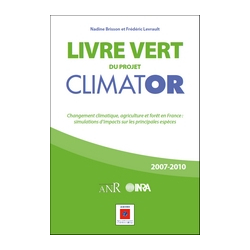 Agrandir l'image
Agrandir l'image
Green book of the CLIMATOR project (The)
Climate change, agriculture and forests in France: simulations of the impacts on the main species
7164
Neuf
What impacts might climate change have on French agriculture and particularly on its cropping systems in the course of the 21st century? To answer this question, 17 teams from 8 agricultural research and development organisations, coordinated by the National Agronomic Research Institute (INRA), collaborated for four years in the CLIMATOR[…] Plus de détails
Télécharger les fichiers
- _76705__CLIMATOR_GB_the_project.pdf — 765.22kB
- _76705__CLIMATOR_GB__A_Methodology.pdf — 2.78MB
- _76705__CLIMATOR_GB_B_Topics.pdf — 5.31MB
- _76705__CLIMATOR_GB_C_The_crops.pdf — 8.08MB
- _76705__CLIMATOR_GB_D_The_Regions.pdf — 6.31MB
- _76705__CLIMATOR_GB_E_Appendix.pdf — 1.12MB
Fiche technique
| Auteurs | BRISSON N, LEVRAULT F, ADEME, INRA |
| Public(s) | Entreprises et fédérations professionnelles |
| Collectivités territoriales | |
| Secteur de la recherche | |
| Administration publique | |
| Thématique | Changement climatique et énergie |
| Produire autrement | |
| Collection | Hors collection |
| Éditeur(s) | ADEME |
| Date d'édition | 2011/03 |
| Référence Ademe | 7164 |
| Nb. de pages | 17 P ; 46 P ; 76 P ; 106 P ; 66 P ; 27 P |
| Format | pdf/A4 |
| Langue | EN |
| Périmètre de publication | National |
En savoir plus
What impacts might climate change have on French agriculture and particularly on its cropping systems in the course of the 21st century? To answer this question, 17 teams from 8 agricultural research and development organisations, coordinated by the National Agronomic Research Institute (INRA), collaborated for four years in the CLIMATOR research project (2007-2010), financed by the National Research Agency (ANR) as part of the programme 'Vulnerability, Environments and Climate' (VMC).
To make a success of this study, these scientists combined climatic models with agronomic and forestry models to simulate the behaviour of cultivated plant stands under the effect of a climate change. This approach, indispensable for exploring the future, brings together disciplines as varied as climatology, agronomy, ecophysiology, bioclimatology, soil science and statistics.
The future agricultural and forest impacts of climate change were analysed in terms of yield, quality of farm products,crop schedules, water requirements and crop health, without forgetting possible displacements of crops. Thirteen sites, representative of the climatic and agriculturaldiversity of France, were studied in metropolitan France and overseas, while the systems selected represent a wide range of its agricultural diversity: annual crops grown in monoculture or rotation (wheat, sunflower, maize, sorghum, oilseed rape etc.), perennial crops (grapevines, grassland, forests, bananas, sugar cane), and with differing levels of inputs (rainfed or irrigated, conventional or organic).
This Green Book, published by Agency for the Environment and Energy Management (ADEME) brings together the main results of the CLIMATOR research project. Half-way between a scientific publication and a book for the general public, it is aimed at all those who, although not specialists in climate change, are concerned for the future of French agriculture: agricultural and forest managers, scientists and technicians, agronomists, government or company agents, teachers and students of agronomy or agriculture, representatives of associations.
The results presented are organised in four parts (methodology, topics, crops, regions) thus allowing everybody to choose what to read according to his or her main interests. The Green Book of the CLIMATOR project published by ADEME.



